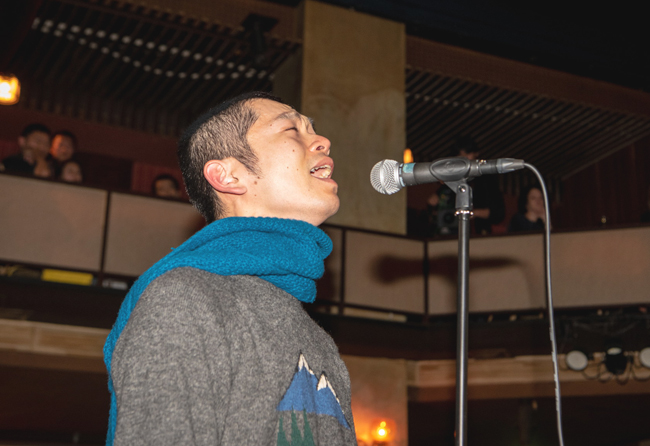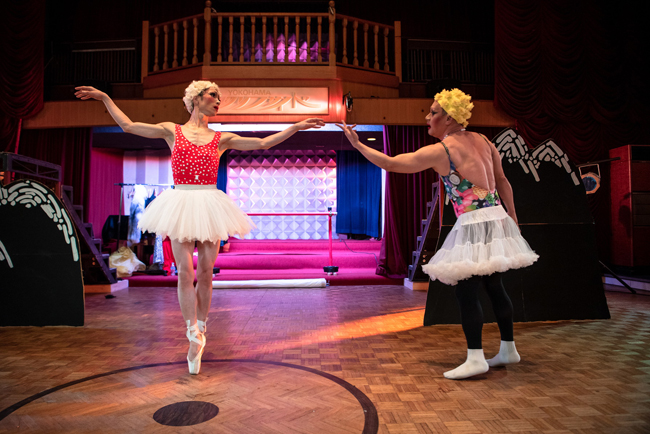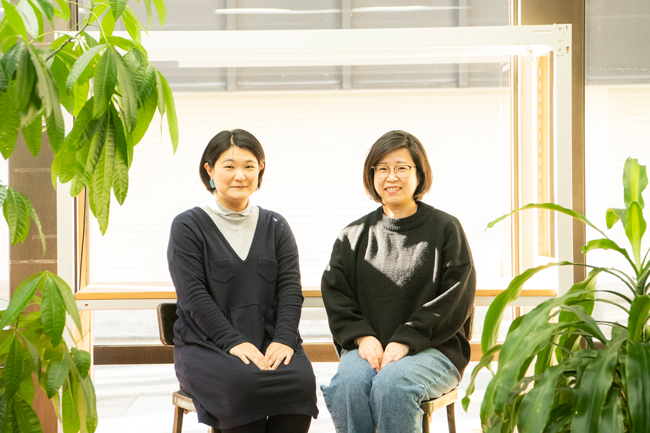Placing oneself on the boundary between performing arts and what is not performing arts, between art and what is not art, and theatre and what is not theatre
Ogura: I thought that the talk session which you planned and moderated last October for PAMS (Performing Arts Market in Seoul) reflected your present interests. The title of the session was Art/art activism, and the speakers were June Tan (Five Arts Center) from Malaysia, Alison Segarra (Sipat Lawin Collective) from the Philippines and Tanwarin Sukkhapisit from Thailand, the country's first openly transgender member of Parliament and also a filmmaker.
Koh: The year before last, I received a grant from PAMS which allowed me to go to BIPAM (Bangkok International Performing Arts Meeting). PAMS, having read my report on BIPAM, then asked me to give a talk related to Southeast Asia. As for the theme, they were open to my suggestions, so I structured the talk around my own interests and decided to invite three speakers from Southeast Asia. The reason why I became interested in activism is connected to what I said before about wanting to be honest. I do not think it is right to take advantage of various subjects and themes for the sake of creating works of art. In order to prevent this from happening, I always like to be involved in the particular subject on a regular basis. The Sewol ferry disaster has certainly taught me a great deal. I have learned from experience that as you become involved in the incident, you forge a bond with the people and naturally come up with various ideas. Being involved in a certain theme on a regular basis is activism. So I am making the point that art and activism can coexist.
Ogura: Another issue that you are trying to become involved in on a daily basis, a subject that arouses your interest, is people with disabilities, isn't it?
Koh: I work three times a week at a support organisation for people with developmental disabilities.
Ogura: What sort of work do you do?
Koh: I mainly support the work of people with developmental disabilities who are in their twenties. For those who are housebound or do not have the opportunity to work or be involved in social activities even though they want to, I help to create such opportunities and networks. Other than that, the peer supporters themselves basically take the initiative in planning and executing projects, and people without disabilities such as myself help them out.
Ogura: How did you become interested in people with disabilities?
Koh: I had always had an interest in gender problems, so you could say that the scope of my interest simply extended to people with disabilities. To be more specific, my work as a creator was what introduced me to this field. It just so happened that I was asked to participate in a certain project. In a place where blind people lived, I was asked to create a piece that focused on the special feature of this area. The request just came out of the blue. I met many people, who I interviewed and learned a lot from. It felt as though they were showing me values and ideas that I had never come across before. Interacting with them made me want to learn more about disability. Eun young Kwon, who directed the second phase of "Theater Practice", was also working for an NPO that supported people with disabilities. On her recommendation, I took a course in nursing and managed to obtain my first grade certificate. And luckily, I was invited to work with an organisation for people with developmental disabilities, something that I had wanted to experience more than anything else.
Ogura: From the programme for this year's TPAM Direction, your text reads like this: "Struggling to integrate my three identities - an individual, citizenship in society and profession of producer - into one, I would like to, for the time being, place myself on the boundary between performing arts and what is not performing arts, art and what is not art, and theatre and what is not theatre." Having spoken to you, I now understand that these are indeed your earnest feelings.
Koh: What is the role of performing arts? What is the role of the producer, and what should an independent producer do? Over the past few years, I have struggled to answer these questions, and the solution that I have found through experiencing this inner conflict, the road that I should take is probably this: to make the move yourself, to put things into practice and take action. And from there, you rely on your own ideas.
TPAM Direction 2020 and beyond
Ogura: May I ask you about this year's TPAM Direction?
Koh: At this year's TPAM, dance was one of the main themes among all types of body expression. If dance was going to be the theme, I wanted to do something with Neji Pijin I like his work, and we once worked together on The Acting Motivation. Mr. Neji invited Umeda Tetsuya to work on our latest project for TPAM Direction 2020, and I was delighted to have him on the team. When I come to think of it, Mr. Neji and Mr. Umeda are the starting point in my career as an independent producer. In this sense as well, I think that the project was fitting as my last work for TPAM Direction.
Also, when I was finalising the programme around last autumn, it was a time when the political and diplomatic relationship between Korea and Japan was deteriorating. I thought that as a Korean, I could not present anything at TPAM without taking this factor into account. There is an email newsletter called "Ali Baba and the Thirty Friends," which I had been following for a while with interest. There are about thirty Japanese and Korean artists involved, and someone writes for the newsletter every day. There is also a project that everyone contributes to and sends out as a group, which is organised by More Jimin, and Akira the Hustler. I was already acquainted with Akira through the interviews for "Anomalous Fantasy," so I consulted him about doing something together as Japan and Korea. And that is how this project, this collaborative performance with More Jimin proceeded.

(C) Rody Shimazaki

(C) Rody Shimazaki
Ogura: I look forward to the performance, how it is going to turn out. Is there anything that you have in mind for the future, anything that you want to do?
Koh: Last year I created four pieces of work, and that is roughly the pace that I would like to keep. And I hope that this creative process does not simply end as a performance. Instead, I would like to create from the point of view of connecting with my everyday actions and my own life. This is not just about me but also about all the people who are involved in creating the work and the audience as well. I hope that the work stays in their minds as something that is connected to themselves. Take for example, the surviving mothers of the Sewol ferry disaster. For them, "Theater Practice" was not merely a fun, one-off event, but through this experience they actually became a YouTuber, a singing teacher and were able to open up a new dimension to their lives. This is exactly the way in which I would like to create my own work. I would also like to continue with my translation work as I believe that translation is part of my job as a producer. This is how I felt when I translated the books of Sakaguchi Kyohei and Ishii Michiko. Similarly, when I introduce Japanese plays, I consider the translation process to be the same as the work that goes into planning and producing the project. My job as a creator involves a lot people, as opposed to my work as a translator, which is done individually at my own pace. I think that for me, the balance between these two tasks is just right.
Ogura: I am always excited and inspired by your plans and ideas, and I look forward to your future endeavors. Thank you very much for today.

[On February 11, 2020 at mass×mass Kannai Future Center]
Interviewer: OGURA Yukako
Project Manager at ROHM Theatre Kyoto. Studied literature at Kobe College. After working as a program coordinator on dance projects at AI HALL (Municipal Theater Hall) in Itami City and as a freelance performing arts manager, she planned and produced dance performances and workshops as the director of AI HALL from 2008 to 2013. A management staff member of KYOTO EXPERIMENT from 2010 to 2015. A TPAM Direction director from 2011 to 2013. A board member of Open Network for Performing Arts Management (ON-PAM). Has been in the present post since April 2016. M.A. in Cultural Resources Studies, Graduate School of Humanities and Sociology, the University of Tokyo.
Photo: HIRAIWA Toru






